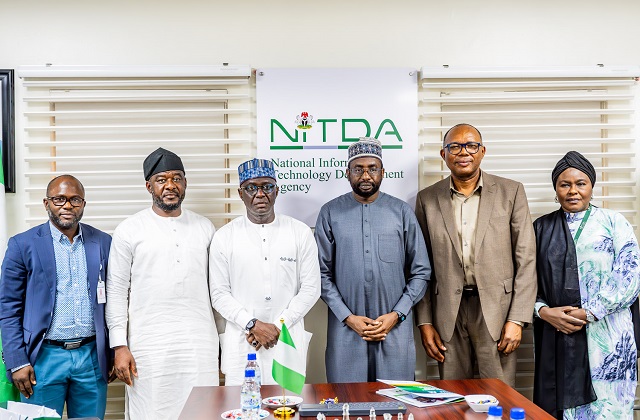News Highlights:
- NITDA to Scale Digital Literacy Initiatives for Displaced Nigerians
- NCFRMI Seeks Holistic Empowerment Beyond Shelter
In a renewed drive to bridge Nigeria’s digital divide, particularly among vulnerable populations, the National Information Technology Development Agency (NITDA) is ramping up efforts to integrate Internally Displaced Persons (IDPs) and migrants into the national digital economy.
This commitment was reinforced during a recent high-level engagement between NITDA and the National Commission for Refugees, Migrants, and Internally Displaced Persons (NCFRMI) at the agency’s headquarters in Abuja.
Director General of NITDA, Kashifu Inuwa, described the meeting as part of an evolving strategy to deepen the digital transformation agenda in Nigeria’s resettlement communities.
He reflected on the longstanding partnership with NCFRMI, which has included capacity-building programmes and ICT support. “We are reactivating and scaling up this collaboration by supplying new IT equipment and introducing customised digital literacy programmes in resettlement cities,” he said.
This renewed partnership is embedded in NITDA’s Strategic Roadmap and Action Plan (SRAP 2024–2027), which seeks to raise Nigeria’s digital literacy rate to 70% by 2027.
Inuwa outlined several concrete steps NITDA is taking to achieve this goal, including the establishment of community-based digital learning centres equipped with shared devices, deployment of trained National Youth Service Corps (NYSC) members to deliver ICT training, and provision of infrastructure tailored to the unique needs of each community.
Additionally, Inuwa revealed that NITDA is collaborating with an international organisation to introduce technology innovation hubs within IDP camps across the Federal Capital Territory. These hubs, he said, will offer more than access to computers—they will serve as spaces for creativity, innovation, and entrepreneurship.
“We need a formalised workstream between our agencies to conduct joint needs assessments, co-design tailored interventions, and scale successful models nationwide,” he emphasised, aligning the initiative with President Bola Tinubu’s Renewed Hope Agenda.
On his part, the Federal Commissioner of NCFRMI, Hon. Tijani Aliyu Ahmed, lauded NITDA’s proactive approach and national leadership, and noted that the sheer scale of displacement in Nigeria—over 6.1 million IDPs and more than 125,000 refugees in neighbouring countries, necessitates stronger institutional collaboration.
While the government is actively responding, Ahmed highlighted that sustainable support for displaced persons must include access to digital skills and technologies.
“This partnership is not just about digital tools, it’s about restoring dignity and creating new opportunities,” Ahmed said. He further stressed the importance of strengthening host communities by enhancing infrastructure such as schools, healthcare services, and access to clean water.
Several resettlement cities have already been developed in states like Kano, Borno, Zamfara, Katsina, and Daura, with a new site in Keffi, Nasarawa State now housing over 40 households. These centres provide not only shelter but also vital services including vocational training hubs, schools, markets, and agricultural land, enabling displaced individuals to begin rebuilding their lives with hope and purpose.
Ahmed underscored the urgency of digital inclusion, especially for younger populations. “Digital literacy is now a vital component of empowerment. With initiatives like JAMB’s shift to Computer-Based Testing, we must ensure that displaced children and youth acquire the ICT skills needed to thrive in today’s world,” he said. “We are fully committed to working with NITDA to ensure no Nigerian child is left behind.”

